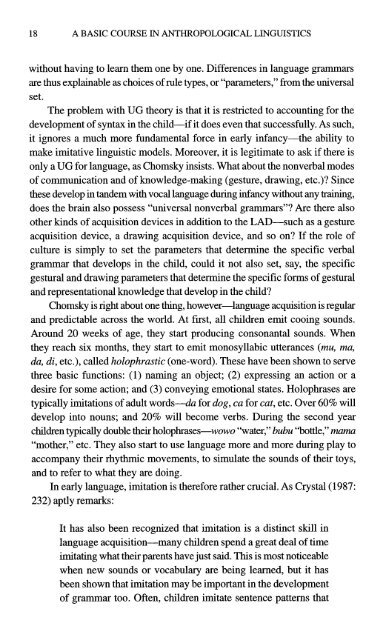A Basic Course in Anthropological Linguistics (Studies in Linguistic ...
A Basic Course in Anthropological Linguistics (Studies in Linguistic ...
A Basic Course in Anthropological Linguistics (Studies in Linguistic ...
You also want an ePaper? Increase the reach of your titles
YUMPU automatically turns print PDFs into web optimized ePapers that Google loves.
18 A BASIC COURSE IN ANTHROPOLOGICAL LINGUISTICS<br />
without hav<strong>in</strong>g to learn them one by one. Differences <strong>in</strong> language grammars<br />
are thus expla<strong>in</strong>able as choices of rule types, or “parameters,” from the universal<br />
set.<br />
The problem with UG theory is that it is restricted to account<strong>in</strong>g for the<br />
development of syntax <strong>in</strong> the child-if it does even that successfully. As such,<br />
it ignores a much more fundamental force <strong>in</strong> early <strong>in</strong>fancy-the ability to<br />
make imitative l<strong>in</strong>guistic models. Moreover, it is legitimate to ask if there is<br />
only a UG for language, as Chomsky <strong>in</strong>sists. What about the nonverbal modes<br />
of communication and of knowledge-mak<strong>in</strong>g (gesture, draw<strong>in</strong>g, etc.)? S<strong>in</strong>ce<br />
these develop <strong>in</strong> tandem with vocal language dur<strong>in</strong>g <strong>in</strong>fancy without any tra<strong>in</strong><strong>in</strong>g,<br />
does the bra<strong>in</strong> also possess “universal nonverbal grammars”? Are there also<br />
other k<strong>in</strong>ds of acquisition devices <strong>in</strong> addition to the LAD-such as a gesture<br />
acquisition device, a draw<strong>in</strong>g acquisition device, and so on? If the role of<br />
culture is simply to set the parameters that determ<strong>in</strong>e the specific verbal<br />
grammar that develops <strong>in</strong> the child, could it not also set, say, the specific<br />
gestural and draw<strong>in</strong>g parameters that determ<strong>in</strong>e the specific forms of gestural<br />
and representational knowledge that develop <strong>in</strong> the child?<br />
Chomsky is right about one th<strong>in</strong>g, however-language acquisition is regular<br />
and predictable across the world. At first, all children emit coo<strong>in</strong>g sounds.<br />
Around 20 weeks of age, they start produc<strong>in</strong>g consonantal sounds. When<br />
they reach six months, they start to emit monosyllabic utterances (mu, ma,<br />
da, di, etc.), called holophrastic (one-word). These have been shown to serve<br />
three basic functions: (1) nam<strong>in</strong>g an object; (2) express<strong>in</strong>g an action or a<br />
desire for some action; and (3) convey<strong>in</strong>g emotional states. Holophrases are<br />
typically imitations of adult words-da for dog, ca for cat, etc. Over 60% will<br />
develop <strong>in</strong>to nouns; and 20% will become verbs. Dur<strong>in</strong>g the second year<br />
children typically double their holophrases-wowo “water,” bubu “bottle,” mm<br />
“mother,” etc. They also start to use language more and more dur<strong>in</strong>g play to<br />
accompany their rhythmic movements, to simulate the sounds of their toys,<br />
and to refer to what they are do<strong>in</strong>g.<br />
In early language, imitation is therefore rather crucial. As Crystal (1987:<br />
232) aptly remarks:<br />
It has also been recognized that imitation is a dist<strong>in</strong>ct skill <strong>in</strong><br />
language acquisition-many children spend a great deal of time<br />
imitat<strong>in</strong>g what their parents have just said. This is most noticeable<br />
when new sounds or vocabulary are be<strong>in</strong>g learned, but it has<br />
been shown that imitation may be important <strong>in</strong> the development<br />
of grammar too. Often, children imitate sentence patterns that






